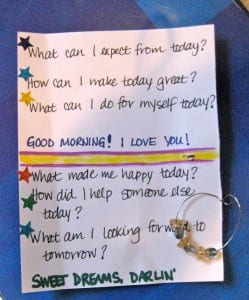Tips for Parents: How Gratitude Combats Entitlement
One of those days where nothing seems to be going your way – we’ve all been there. You get up late, spill your coffee, remember that assignment that’s due at the last minute, trip over the dog on your way out the door. I used to wonder why some days were that way, continually spiraling out of control with one thing after the next falling to pieces.
These days, I’m convinced it’s a matter of attitude. What we pay attention to in any given moment seems to grow in importance. That’s not to say that there aren’t some things that are more vital and deserve more attention than others, but for the most part, we can choose how to see our lives – as a rolling disaster or as a pretty charmed life with some mishaps thrown in.
If we expect our lives to go smoothly, we will almost always be disappointed. Often that expectation translates to entitlement – we deserve to have a particular level of calm and, because we are “good” people and work hard, we are owed this courtesy. Because of the way teens’ brains are wired (to think of themselves as the center of the universe), that can mean that they get angry with their parents when things go wrong or turn out to be more difficult than they imagined. This can lead to excuses (I didn’t do it because it shouldn’t have been that hard. I shouldn’t have to do ‘X’.) and shortcuts. When this attitude persists over time, it can mean that your teen sees things through smoke-colored glasses – every thing that doesn’t come easily to them or work out perfectly is call for anger or frustration. So how do we, as parents, help mitigate that and bring our teens back to a place where they are happier and more appreciative of the life they have? In a word, gratitude.
While it’s true that often we have no control over the things that go wrong in our lives, we also have no control over some of the most beautiful and gracious gifts that come to us. The more we can help our teens learn to pay attention to those things, the more they can understand that there is so much good out there in life that surrounds them all the time. While it may feel trite to notice a gorgeous sunrise when you’re failing your history class, it is also an important part of adolescent brain development to exercise that part of the brain that allows for the simultaneous existence of beauty and struggle. This is one of the executive functions that teens really need to develop in order to move beyond concrete, black-and-white thinking. And as they are doing it, they can begin to alter their perceptions of the world. They can shift their thinking from believing that the world is a place that owes them a certain level of calm and entertainment to seeing their relationships and the complexities of the world around them that support them in all that they do as something that is amazing and wonderful.
More on gratitude and gratitude practices can be found here.



